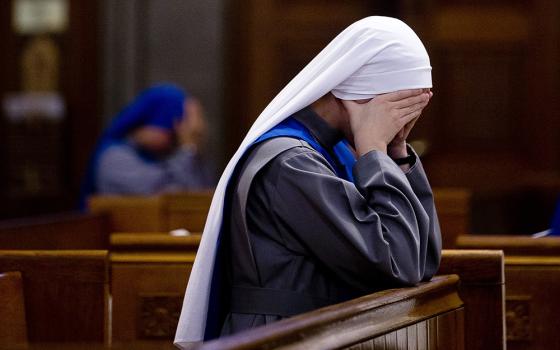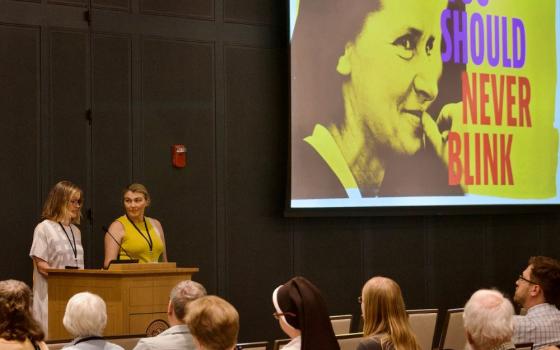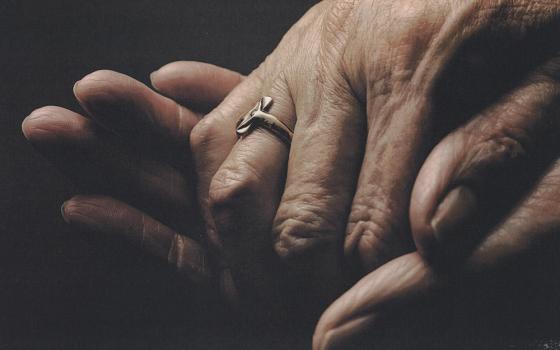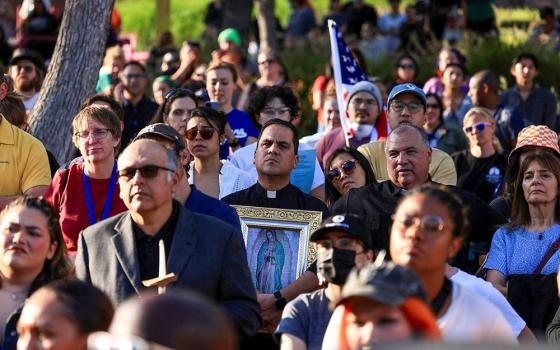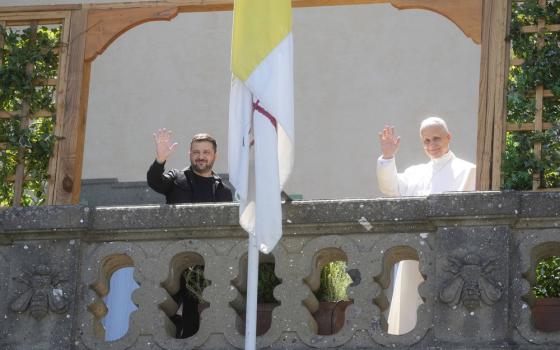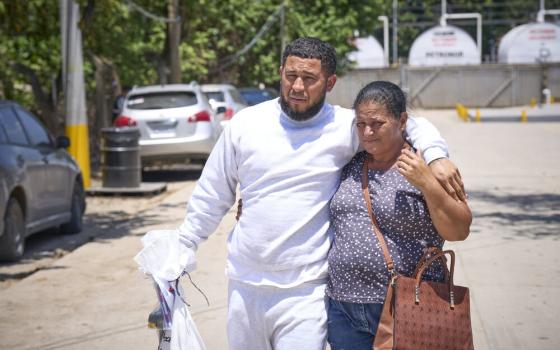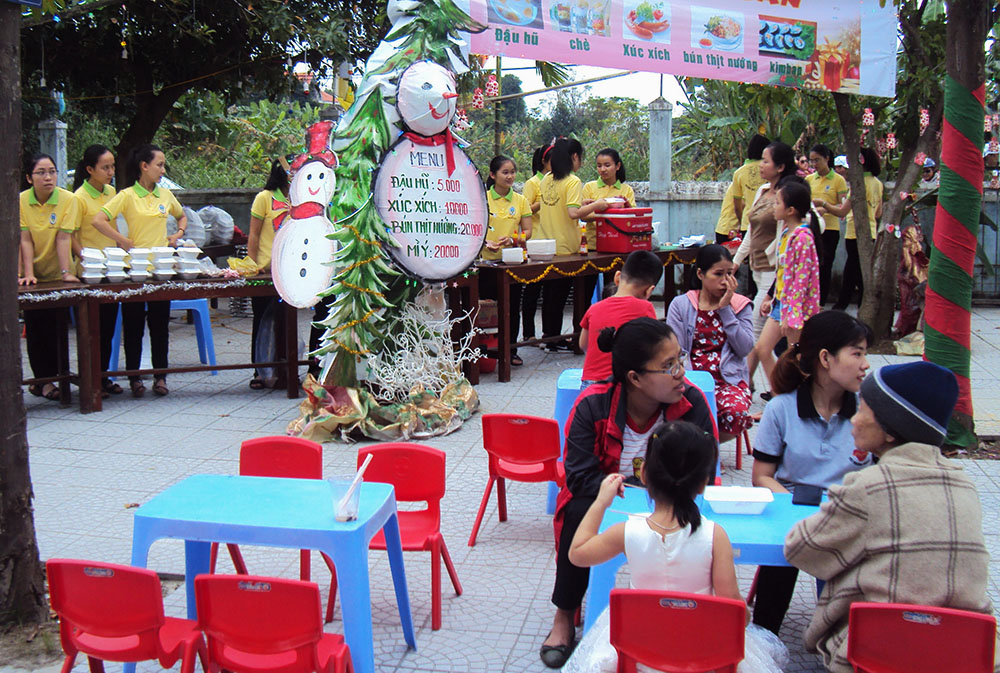
Lovers of the Holy Cross nuns hold a "Christmas market" serving food with budget prices to local people on Dec. 12 at Pho Thach Parish in Phong Dien District of Thua Thien Hue Province, Vietnam. (Peter Nguyen)
Christmas celebrations promise to be different this year amid a global pandemic. There's a nostalgia for usual customs and traditions that may have to be modified or omitted because of COVID-19 restrictions and the recognition of greater needs to address. Yet around the world, sisters are finding ways to highlight this special time of year with the people they minister to and within their own communities. Global Sisters Report is presenting a sampling of such efforts from around the world.
We also invite you to spend some time with our special Moments of Grace e-book, available at the end of the story, a collection of sisters' reflections of "finding the good" amid a pandemic. We at Global Sisters Report wish all of you and those you hold dear a blessed Christmas and happy and healthy new year.
Argentina: Missionaries in the neighborhood
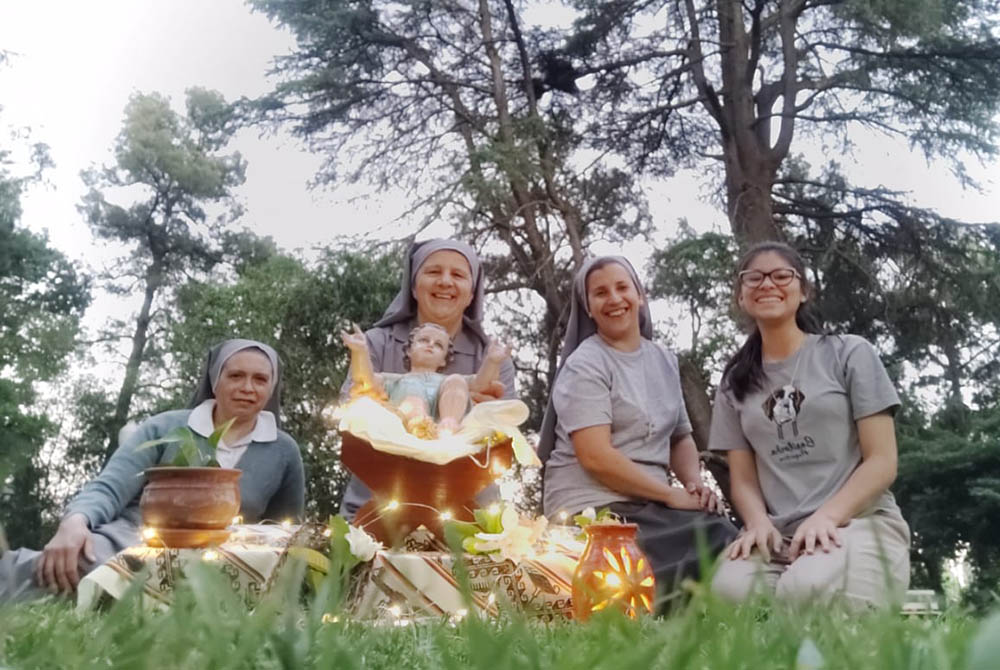
Servant of Sacred Jesus Sr. Evangelina Herrera, second from right, said that every year for Christmas, her community in Buenos Aires celebrates together so that those who live far from family are kept company with their "religious family." Here, they're at a retreat in the days leading up to Christmas 2019. (Provided photo)
The annual mission trip Sr. Evangelina Herrera takes with a local youth group in Buenos Aires is technically canceled this year because of the pandemic, but that's not how the Servant of Sacred Jesus sister sees it.
In San Miguel, a part of greater Buenos Aires, Herrera and her fellow sisters and the youth group spend a week in another part of Argentina doing mission work with another youth group from the province of Córdoba. But because coronavirus restrictions prevent the two groups from traveling, she said they'll turn their attention to local needs, being missionaries in their own neighborhood.
"We're working on collections and food donations to give to families, to try to help those who are going through a hard time," she said. "They need material goods, but in this time of so much isolation and of being shut inside, there's a need to be heard and listened to."
The country has imposed strict quarantine guidelines since March. Despite the restrictions, Argentina has experienced more than 1.5 million cases and 40,000 deaths.
"We've been cut off from our communities and need accompaniment, so that's a great need we've been witnessing in our people," Herrera said.
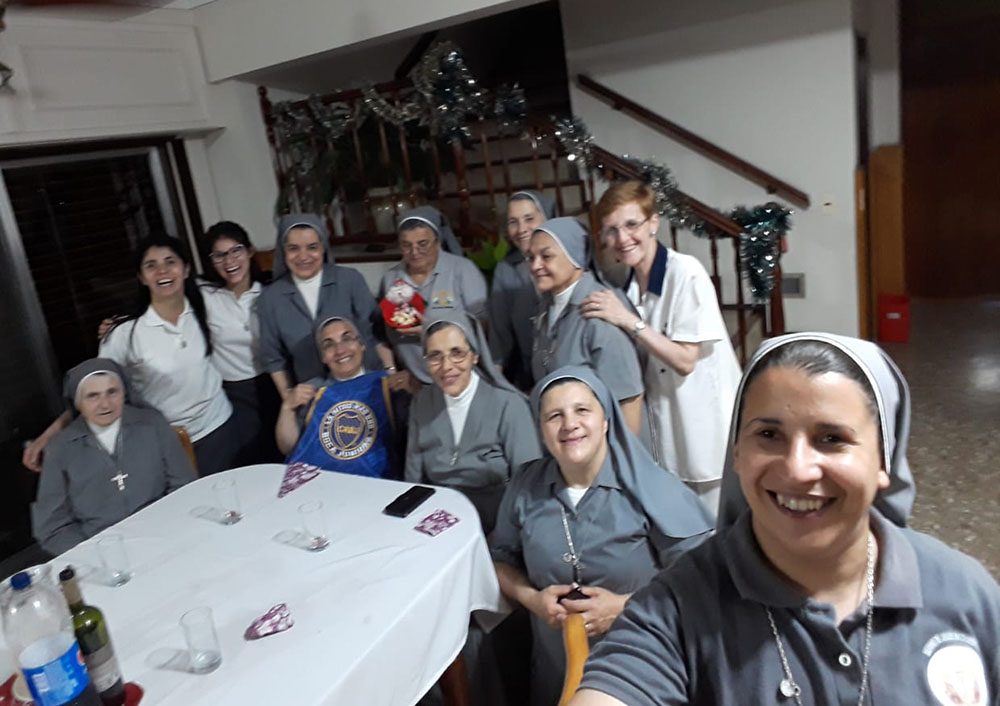
Servant of Sacred Jesus Sr. Evangelina Herrera, taking the selfie, celebrates a previous Christmas with her community, a tradition that they'll be able to maintain this year despite the pandemic's disruptions. (Provided photo)
Though she is sad they won't be able to carry out the mission trip as usual and experience the joy firsthand of the families who host them, this shift is an invitation from Jesus to "re-create ourselves" and create new opportunities, she said. One idea is to visit elderly people who are still uncomfortable attending Mass with other people, offering them company while staying on their front stoops at a distance.
The task before them, she said, is to figure out: "How do we find or create the mission in our own area?"
Bolivia: Mothers have to miss their holiday crafts market
About 200 mothers in a countryside outside Potosí, Bolivia, were left this year without the sewing workshop and formation classes that the Infant Jesus Sisters host to help them develop marketable skills while fostering community and relationship.
That also means their annual Christmas tradition — an exposition of their crafts, an event that brings together locals as the women showcase and market their goods while celebrating the holiday — won't be happening this year, either.
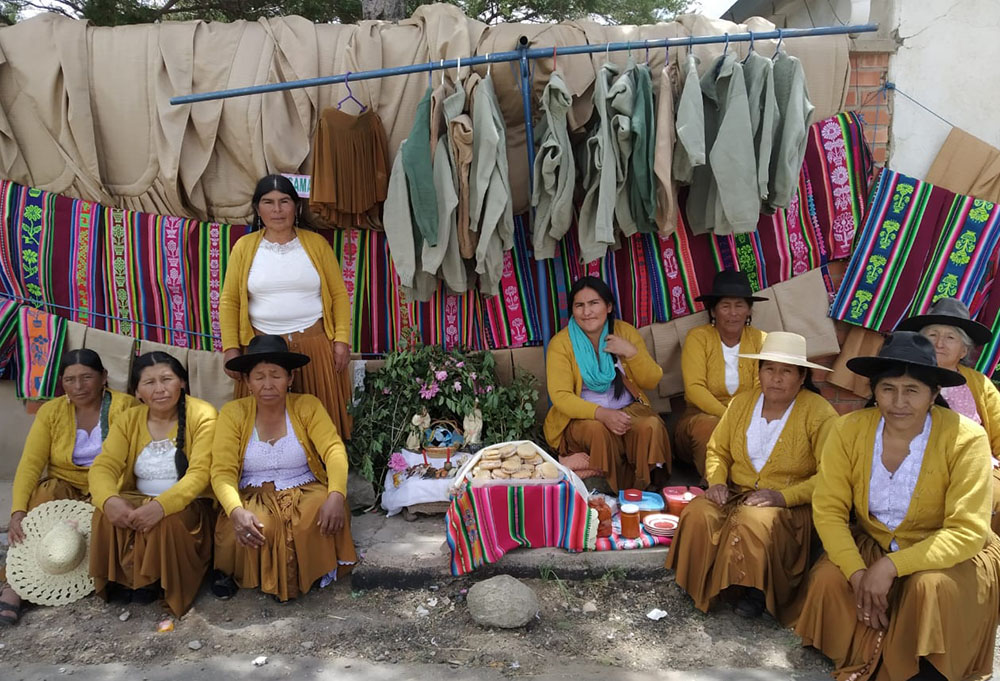
In a countryside outside Potosí, Bolivia, locals observe Christmas with the crafts fair that Infant Jesus Sr. Adele Manenti and her fellow sisters organize for mothers in the area, following their participation in the yearlong workshop where they develop crafting skills. This year, however, they were unable to host the workshop or the fair, due to the pandemic. (Provided photo)
Infant Jesus Sr. Adele Manenti said the formation they offer the local mothers covers a variety of themes, including information on hygiene, ecology and religion as well as the sewing workshops.
"In the countryside, all the mothers need help," she said, noting that they tend to live off potatoes and beans. "The mothers are the ones who are intent on escaping poverty and developing skills in pursuit of a better future."
Manenti said the mothers call to ask when they will be able to get together, "but it's impossible with the pandemic. We're hoping to celebrate Christmas over Zoom, for those who have a computer to have Mass together and say hi to one another."
Above all, she said, "we want the mothers to enjoy Christmas with their families, but we won't be able to go above and beyond like we'd like."
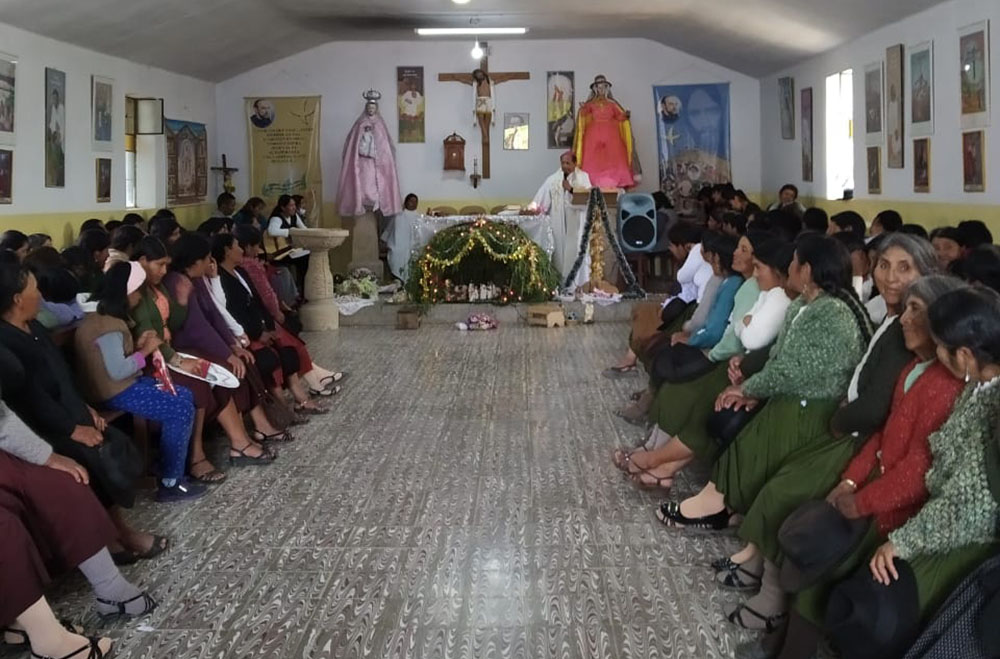
While the crafts fair also includes a Christmas Mass, Manenti said that they'll try to maintain that tradition over Zoom this year. (Provided photo)
Bolivia has experienced almost 150,000 cases of coronavirus, with more than 9,000 deaths. Manenti said those in the country tend to contract the virus if they go into the nearby city of Potosí. Their local community has lost six people to COVID-19, she said.
"We're saddened because our community has lost a lot of people," she said. "We're trying to give hope and accompaniment to those who are in pain, those who are grieving, so we'll be sharing Christmas with them."
Ghana: Celebrating with street children
Every year, the St. Louise Community of the Daughters of Charity of St. Vincent de Paul gather about 120 children in street situations in Kumasi, a city in southern Ghana, to celebrate Christmas with them at Safe-Child Advocacy, a humanitarian organization owned by the Kumasi Archdiocese but managed by the sisters. Four of the sisters are preparing to celebrate the coming of the Lord with the street children, who are mostly Muslim.
Given concerns about the pandemic, the Daughters of Charity, management and staff of Safe-Child Advocacy reflected on how to celebrate Christmas with children living on the streets. The sisters decided that from Dec. 20 to 22, they would not gather children to celebrate at their premises, but will cook food and share it with about 500 children and people experiencing homelessness on the main streets of Kumasi.
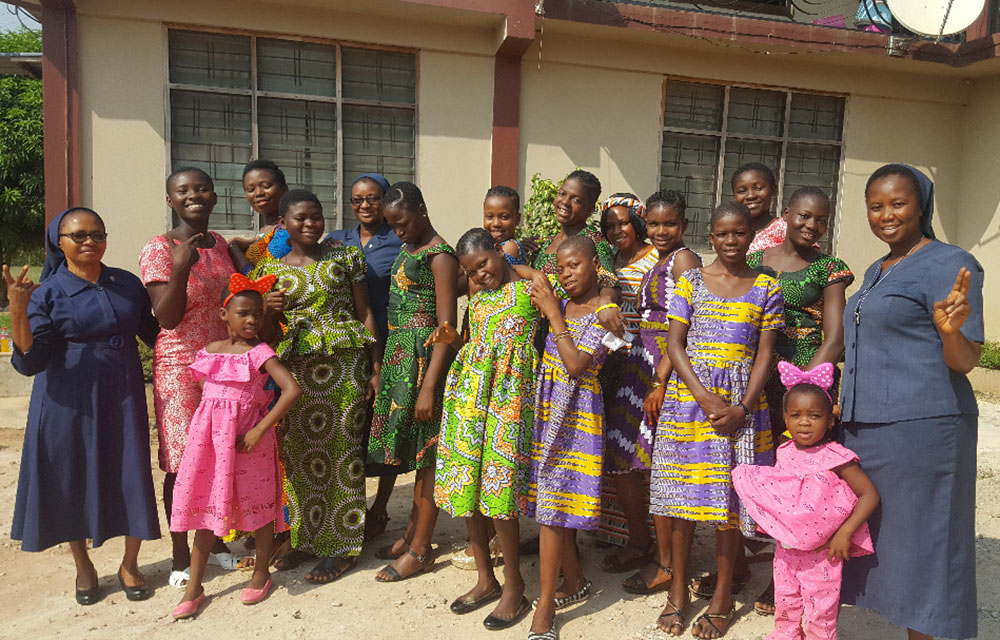
Sr. Catherine Eking (left), head of the St. Louise Community of the Daughters of Charity Sisters in Kumasi, Ghana, and Sr. Victoria Anamuni (right) pose with children of the Safe-Child Advocacy humanitarian organization. (Damian Avevor)
"For us Daughters of Charity, Christmas is one of the moments we stand side by side with the poor. We celebrate Christmas with them to incarnate God's love revealed in the mystery of the Incarnation," said Sr. Catherine Eking, head of the community.
"We never spend Christmas away from our communities because we need to celebrate with persons in poverty. They are our lords and masters, in the words of our founders. We make the choice to serve them and so we do our best to make them truly celebrate Christmas."
On Dec. 25, the sisters plan to host a Christmas party for children who reside at the St. Louise Vocational Training Centre in Appiadu, Kumasi. Some of the street girls who are being trained at the center are expected to visit their families to connect with them during this time. Up to 40 children would be left at the center to celebrate this year's Christmas party.
Central India: A small, quiet sharing of Christmas message
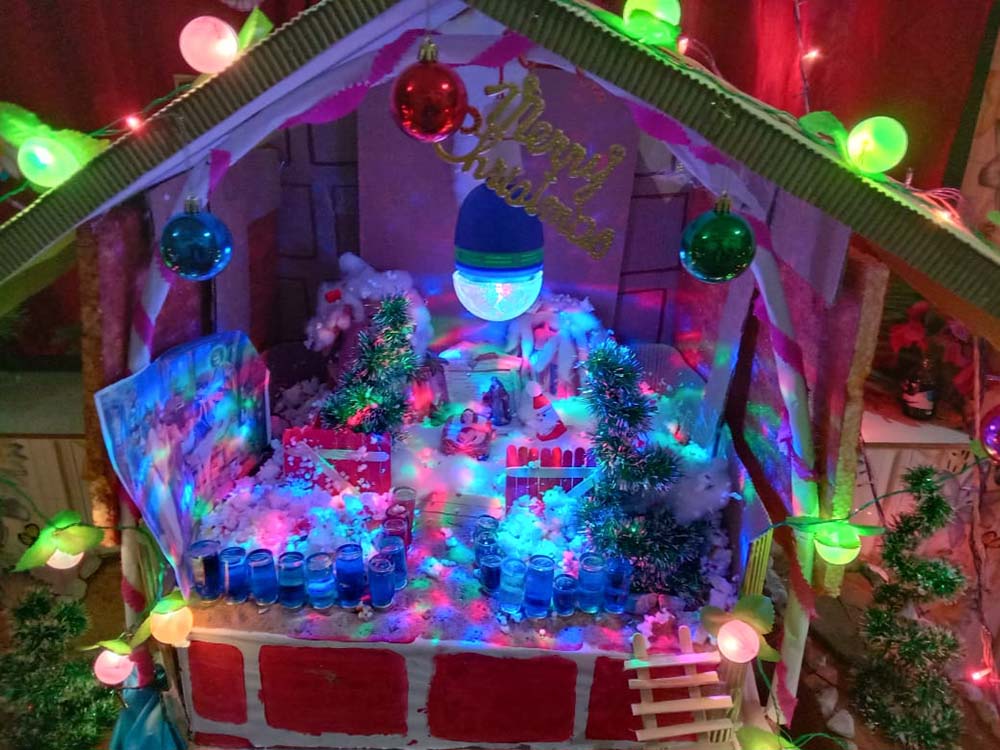
Christmas crib prepared in the generalate of Deen Bandhu Samaj at Jagdalpur in the central Indian state of Chhattisgarh in 2019 (Provided photo)
COVID-19 has dampened the Christmas celebrations of the sisters of Deen Bandhu Samaj (Society of the Friends of the Poor), who work among the Indigenous people in the Bastar region of Chhattisgarh, a central Indian state.
The coronavirus has infected as many as 42 of the congregation's 139 nuns working in the Maoist region, the latest hotspot for Christian persecution in India. Right-wing Hindu activists oppose Christians' charitable works, saying they are a façade to convert tribal people.
The congregation serves mainly in Jagdalpur, an eparchy of the Eastern rite Syro-Malabar Church.
Sr. Ann Mary Chempakasseril, the superior general of the Syro-Malabar congregation, said that in the past, they started Christmas celebrations from the first day of Advent.
"We used to prepare to share the Christmas joy with people of all religions in our neighborhood," she told Global Sisters Report.
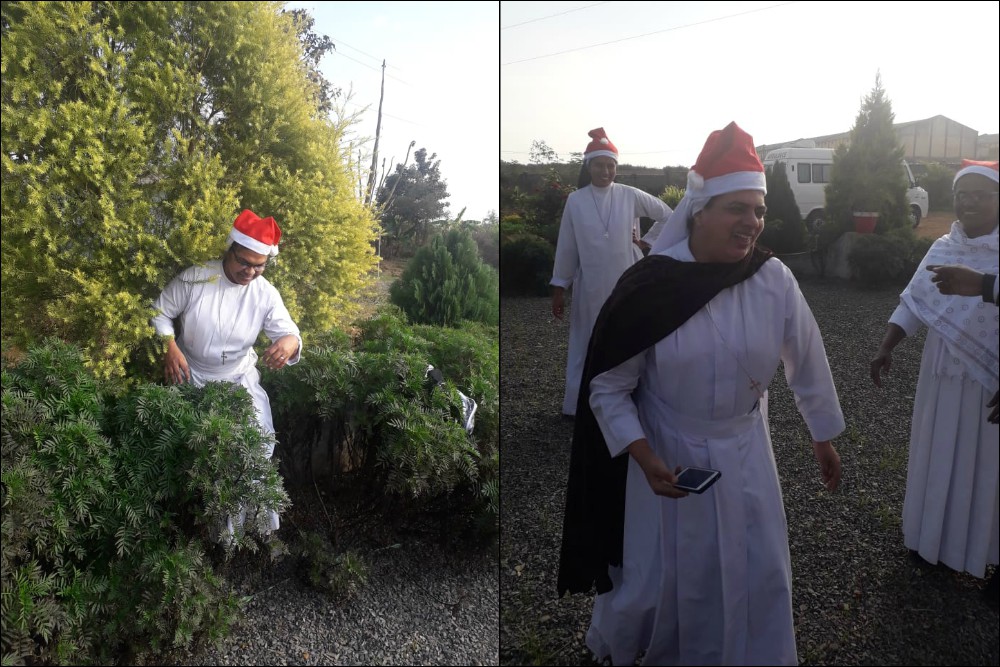
Members of the Deen Bandhu Samaj sisters celebrate Christmas at their convent at Jagdalpur in the central Indian state of Chhattisgarh in 2019. (Provided photos)
The restrictions and hike in anti-Christian attacks prevent the nuns from organizing Christmas celebrations.
"We have suspended all the large Christmas gatherings involving outsiders, as COVID-19 restrictions do not permit it," said Chempakasseril, who once faced a death threat from some villagers who misunderstood her work.
However, the nuns have begun their spiritual preparation. They plan to share the Christmas message at least with area Catholic families "in a very small way, as visiting homes has become a difficult task."
The nuns plan to pool their resources to arrange food packets and gifts to distribute to those families where they can safely share Christmas joy.
India: Small group celebrations in Bhopal
Sr. Lizy Thomas says she will miss this year the joy of celebrating Christmas with people who are, as she put it, on the peripheries.
"We used to celebrate Christmas in the company of HIV/AIDS patients, migrants, domestic workers, school dropout girls, slum people, besides students and teachers in our schools," Thomas, a member of the Central Indian province of the Missionary Sisters Servants of the Holy Spirit, told Global Sisters Report.
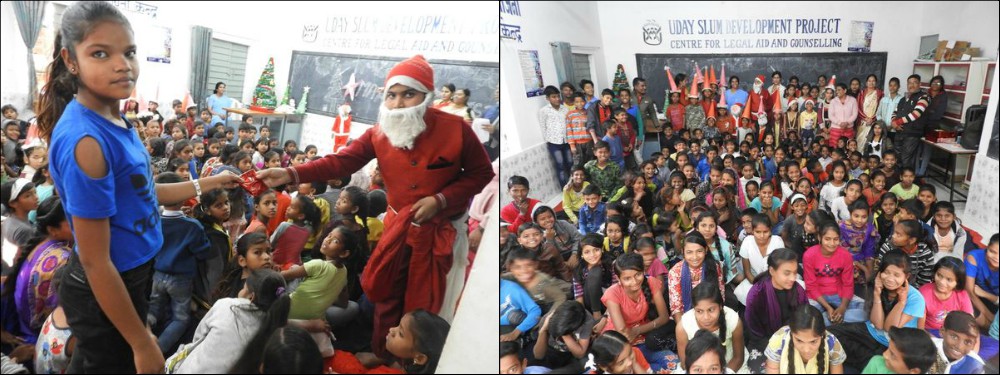
At an event organized by the Missionary Sisters Servants of the Holy Spirit in 2019, children from poor families celebrate Christmas in Bhopal, capital city of central Indian state of Madhya Pradesh. This year, celebrations will be much smaller because of coronavirus pandemic restrictions. (Provided photo)
She said they used to cut cakes and exchange Christmas gifts, along with organizing various cultural programs for them every Christmas.
But this year, she said, "we have to avoid such gatherings and restrict to token celebrations to comply with the COVID-19 restrictions."
Many locals now sound nostalgic about the nuns' Christmas celebrations in the past, she said: "Most of them are not Christians but always greeted us with love and care."
She said they plan to celebrate Christmas observing all protocols of the pandemic.
"The sisters and staff in the province plan to celebrate Christmas in groups of 40 to 50 people, as we cannot accommodate everyone," she said. They will try to organize carol-singing and provide refreshments to as many as possible without violating the protocols.
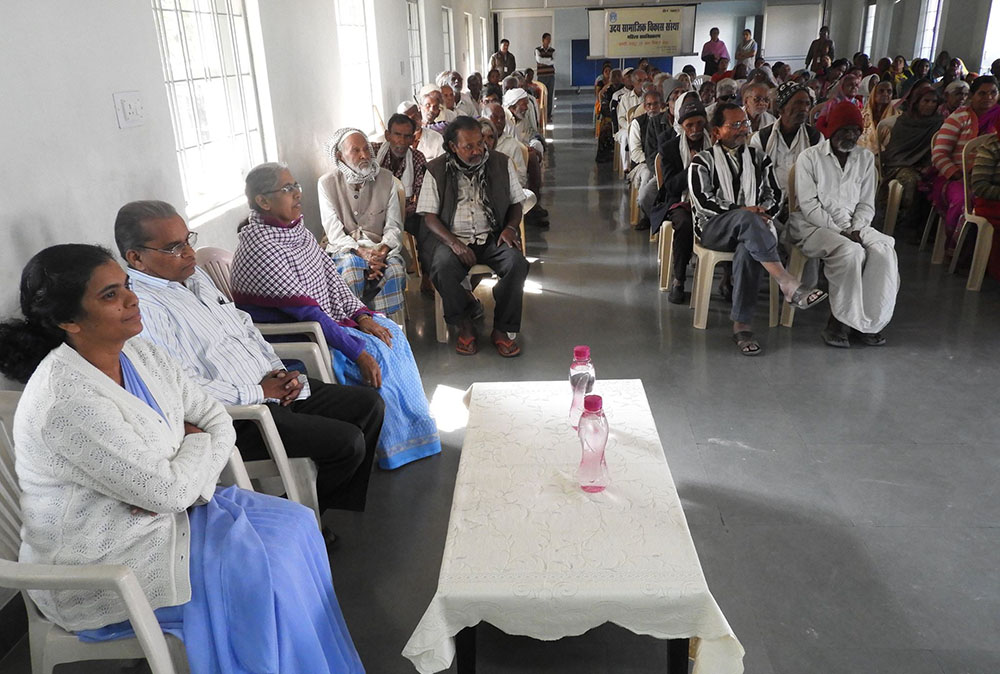
Sr. Lizy Thomas (left) attends a special Christmas function for elders from a poor economic background, organized by the Missionary Sisters Servants of the Holy Spirit nuns in Bhopal, capital of Central Indian state of Madhya Pradesh, in 2019. (Provided photo)
The Catholic nun, who belongs to the Latin rite congregation, said they celebrate all major festivals in India as part of their tradition to respect all religions in the country. This year, they've been forced to limit such celebrations to small gatherings in keeping with coronavirus safety protocols, said Thomas, who manages a nongovernmental organization in the central Indian city of Bhopal.
The sisters will focus more on enhancing prayer, meditation and other spiritual activities during this Advent, Thomas added.
Nigeria: Tradition of sharing within community continues
The sisters of Notre Dame de Namur in Southeast Nigeria are coming together to celebrate Christmas, have spiritual reflections while sharing community bonds and extending love and the spirit of the season to vulnerable people around them.
Sr. Ifeoma Ubah and three other sisters run the Notre Dame Nursery and Primary School, established in 1993 for pupils in the rural area. More than 250 children of mostly farmers and artisans attend the school at no cost. The sisters live at a community house close to the school.
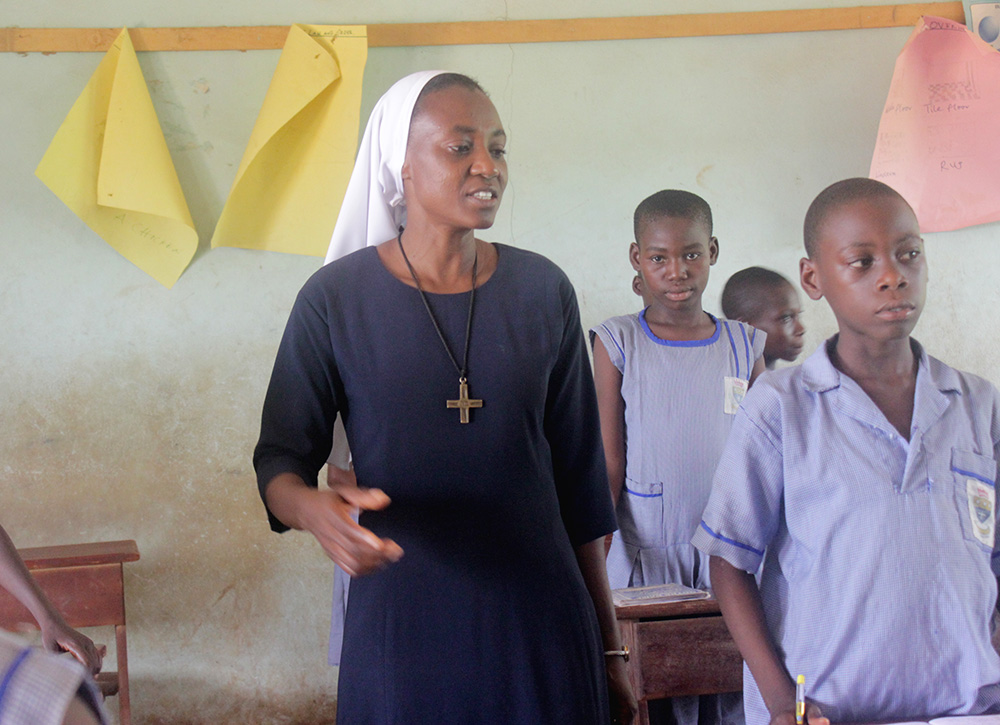
Notre Dame de Namur Sr. Ifeoma Ubah speaks to pupils of the Notre Dame Nursery and Primary School in Southeast Nigeria in 2019. (Patrick Egwu)
The COVID-19 restrictions have disrupted the normal activities of the school during Christmas, such as carols and singing competitions, usually attended by students' parents and guardians, Ubah said. The community will observe COVID-19 safety protocols while celebrating this year's Christmas activities, she said.
"We are always conscious to make sure everyone is protected and following safety measures," she said.
There has been a drop in Nigeria's coronavirus cases recently. There have been more than 77,000 cases of COVID-19 in the country with 1,212 deaths as of Dec. 19. The daily cases have also dropped significantly compared to earlier scenarios during the outbreak.
For the sisters, the Christmas season is also a time of giving back to the community. They visit homes and share relief supplies with families.
"We give them whatever we have so they can join us to also celebrate in their respective homes. This is our own way of showing them love and a sense of belonging," said Ubah, who is the headmistress of the school.
Still, the pandemic will not affect one tradition of the sisters, who gather Dec. 26 to celebrate Christmas, share time together and tell stories about their works in their respective places of assignments.
"This is a tradition for us each year," she said. "Even though the pandemic has affected a lot of things, we would still be meeting on that day to share time together in our community."
On that day of the Christmas get-together, she said, "we shall eat, dance, have some fun and share gifts among ourselves."
Philippines: Dawn novena traditions, virtual chapel openings
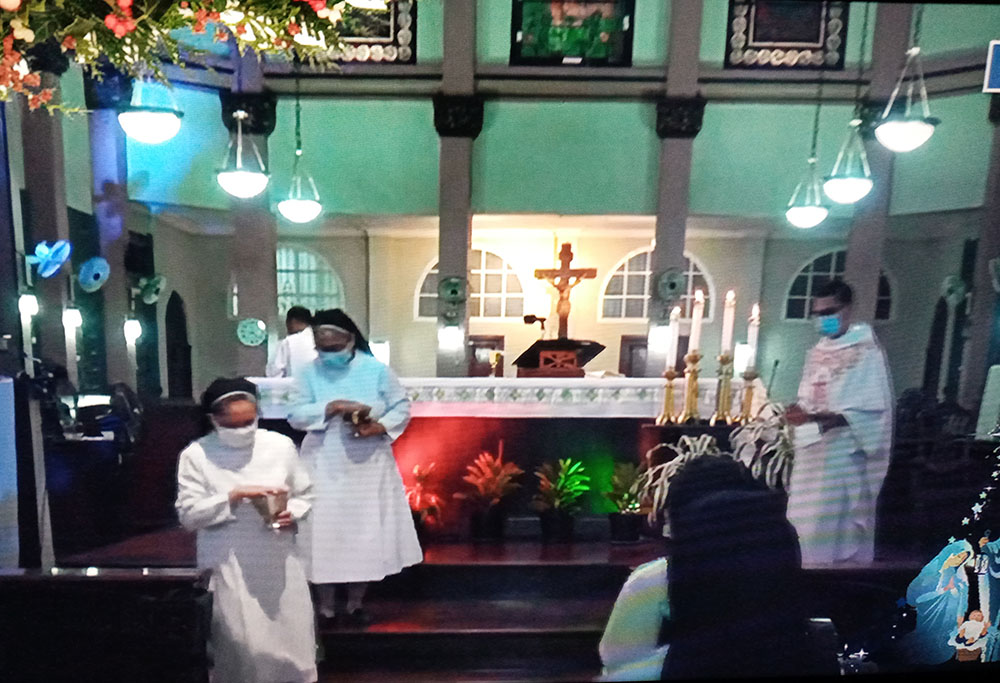
Benedictine sisters with face masks descend from the altar to distribute Communion during a livestreamed Mass. (GSR screenshot/Ma. Ceres P. Doyo)
With the strains of "Halina, Jesus, halina" ("Come, Jesus, come") filling the air, the Filipino traditional nine-day novena of Masses began at dawn Dec. 16 to last until Christmas Eve. Unlike in Decembers past, the churches will not be packed this time, because of government prohibition against mass gatherings in the midst of the COVID-19 pandemic.
The Philippines had the longest lockdown period in the world. It began in mid-March and eased by different degrees in different areas around October. Closed churches recently opened to a limited few who were required to observe safety protocols. The rest of the Catholic faithful will have to fulfill their nine-day novena panata (sacred promise) by attending Masses streamed online.

Online invitation and link to Mass at the Carmelite Monastery in Lipa City (GSR screenshot/Ma. Ceres P. Doyo)
Congregations of religious sisters are among those who have virtually opened their chapels for the people's online attendance of Misa de Gallo (Mass of the Rooster, or dawn Masses). This tradition began sometime during the 400-year Spanish colonial period, which ended in 1898. The nine Masses are held at the crack of dawn, around 4:30 a.m., so that people, farmers mostly, could afterward proceed to their day's work. It has been the practice to this day, although in cities, some "dawn Masses" have become anticipated Masses held the previous night.
The monastery of the Discalced Carmelites in Lipa City in Batangas province and St. Scholastica's College chapel of the Benedictine Missionary Sisters and the College of the Holy Spirit chapel of the Missionary Servants of the Holy Spirit, both in Manila, have Masses streamed online.
"Many had been clamoring that we livestream our Masses because they missed visiting our chapel," Discalced Carmelite and former prioress Sr. Mary Grace Rillo told GSR. "Many are also clamoring that we open our chapel."
But with the mother prioress concerned about coronavirus safety, instead, "we are starting with livestreaming. In time, the next step is to open our chapel with the necessary protocols."
The Carmel Monastery in Lipa City is the site of a 1948 Marian apparition and the series of rose petal showers. The story has been written in two books and featured in documentaries, but the church hierarchy has not approved it despite the endorsement of some bishops. Nuns who witnessed the miracles and the postulant to whom Mary reportedly appeared at that time went through investigations by the hierarchy, but the devotion to Our Lady Mediatrix of All Grace (as the Virgin Mary reportedly called herself when she appeared) continues to this day.
The apparition site with the Marian statue in the monastery is an enclosed area with a viewing deck for devotees. The now-popular Marian image has been used in calendars, medals and prayer cards. The Lipa monastery is one of 21 Discalced Carmelite monasteries for women in the Philippines.
Going live on Facebook was not easy for this community of contemplatives.
"It took a lot of adjustments beginning the first Sunday of Advent," Rillo said. "The balance of voices has improved, but not good enough. We are grateful for feedback. Our techie is a sister who does it from inside. Two extern sisters do the readings. It takes all kinds in a community of nuns."
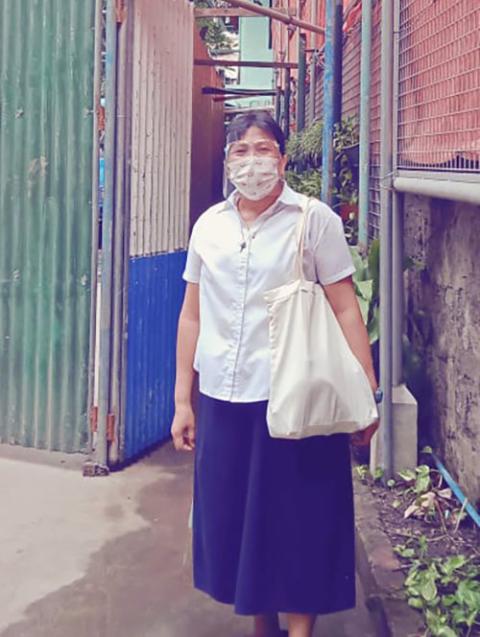
Sr. Juanita Daño heads to her first Misa de Gallo with the Good Shepherd community after nine months of self-imposed separation. (Provided photo)
Good Shepherd Sr. Juanita Daño, who works in a depressed area's basic ecclesial community, counseling families and drug users in San Andres Bukid*, traveled to the Good Shepherd Provincialate in Quezon City (about 7 kilometers away) for dawn Mass, her first with the sisters after months of being alone in a rented unit in her ministry area. Daño belongs to the Good Shepherd Sisters' Welcome House crisis center community a few kilometers from her ministry area but had kept herself away in order not to bring virus infection to the elderly sisters.
The Holy Spirit Sisters dawn Masses are their way of connecting with their alumni, who were saddened by the announced closure of their 107-year-old alma mater, which has graduated noted and outstanding citizens over the years.
The Benedictine sisters, known for their liturgical music and college of music, also went online with shots of the neo-Gothic chapel.
Virtual Massgoers express their thoughts, feelings and reactions through the "comment" button that could be read by those in attendance. Readings, songs and prayers are shown on screen. Many Filipinos have adjusted to virtual Masses but prefer going physically to churches of their choice that are open for only a few who can be seated in marked pews.
The government recently announced that the Jan. 9 feast of the Black Nazarene, which draws several millions of unshod, crimson-clad devotees to the streets of Manila yearly, has been canceled because of the pandemic.
Several communities of religious sisters, including contemplatives, said that this Christmas, their celebrations would be much simpler than in the past, but their workers would still be their main concern, the object of their gratitude especially during the pandemic.
United States — Alaska: Simple traditions among Native people
Among the Native people in Alaska, the Christmas traditions are like those of the past, without the consumerism that marks the holiday in much of the United States.
Sr. Frances Vista, a Daughter of Charity of St. Vincent de Paul, said that in Anchorage, where she is director of Catholic Native Ministries for the archdiocese, Christmas is no different than in any other large, urban area. But in the rural areas, there are few stores and no malls.
"They do a lot of homemade gifts for the children," Vista said. "They do a lot of cooking and baking. They'll make a lot of something, and then when someone comes, they'll wrap a few and give them to the people."
With a global pandemic, of course, it's not clear how widespread those types of gatherings will be, she said.
Advertisement
Many Native people attended Catholic boarding schools, she said, so they carry on with Catholic Christmas traditions, though sometimes they are melded with traditional practices.
"It's a lot of really simple traditions," Vista said. "Things like making snowmen and sledding."
Vista is from the Philippines, and there are Catholic churches in Anchorage that follow the Filipino tradition of a novena of Masses followed by a potluck of Filipino foods.
"I do enjoy it very much because I get to see and eat labor-intensive dishes that I don't usually eat in a daily basis," she said. "Celebrating the Filipino tradition in Anchorage, Alaska, at this time is always a gift."
But it's a gift that she won't get to experience this year: The Masses are canceled due to the pandemic. Vista and the two sisters she lives with also won't be able to carry on their tradition of gathering with their Vincentian priest.
"As a community of sisters, there are very little differences because we usually celebrate everything that is happening in the parish," she said, and they will participate in whatever events aren't canceled. "But it will be all low-key, with no music or fanfare."
United States — Indiana: Decorating for livestream
Christmas in the Church of Our Lady of Loretto on the campus of St. Mary's College, Notre Dame, Indiana, is always a festive occasion. Also part of the Sisters of the Holy Cross motherhouse, the church in other years has been carefully decorated and packed for holiday Masses.
This year, the seats will be mostly empty. Holy Cross Sr. Joan Marie Steadman told GSR in an email that colleagues and sisters who worshiped in the church prior to the pandemic will gather by Zoom for a celebration of the Liturgy of the Word on Christmas Eve.

A Christmas crèche is displayed at the Church of Our Lady of Loretto, Notre Dame, Indiana, during the 2019 Christmas season. (Provided photo)
On Christmas Day, a small group of the approximately 140 sisters living at the motherhouse will be present in the church, with a livestream providing access for others, Steadman added.
How the church has been decorated has been impacted by COVID-19 restrictions, said Carrie Bowie, liturgy director for the community. "The Christmas crèche will be set up right behind the ambo, so it's visible on livestream."
"Our celebration will be marked by simplicity and solidarity," wrote Steadman, who is also the former executive director of the Leadership Conference of Women Religious. "We will welcome Christmas with care and compassion for our sisters and brothers in the global community."
United States — Massachusetts: Intercultural celebrations via Zoom
With about a dozen sisters from Zambia, Korea, Italy and Romania, as well as the United States, the Franciscan Missionary Sisters of Assisi are accustomed to gathering for an international Christmas holiday at St. Francis Convent, the vice-provincial house in Holyoke, Massachusetts.
Sr. Carol Woods, who ministers in Brooklyn, New York, with two other sisters, usually looks forward to coming together with the other members of the community serving in New Mexico and Massachusetts.
"It's very intercultural," Woods said. "We talk about what Christmas is in different places."
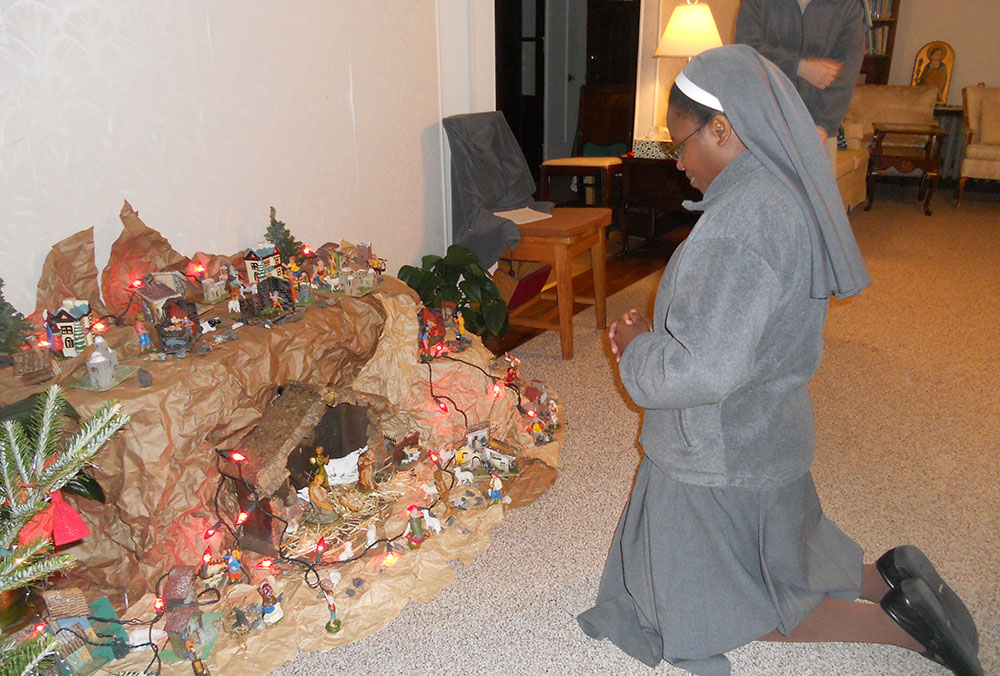
Sr. Dorcas Cordilia Munthali of the Franciscan Missionary Sisters of Assisi, who ministers in Brooklyn, New York, kneels to pray before the crèche at St. Francis Convent, Holyoke, Massachusetts, during the Christmas gathering in 2018. (Provided photo)
The Christmas meal would normally feature delicacies from around the world like sushi, panettone and Zambian nshima, Woods added. There would even be some dancing. Some of the days would be community-focused, with at least one day open to inviting friars living in the area and the elderly who might not have a place to go for a holiday meal.
This year, with travel restricted, a Zoom meeting will take the place of the in-person gathering, Woods said. "It'll still be good, but it won't be the same."
United States — Washington state: Gathering and storytelling
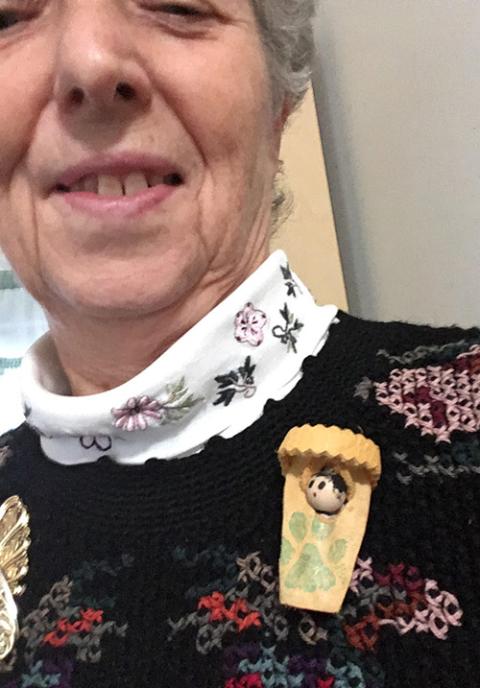
Yakama people traditionally put newborns and babies in a baby board that holds them tight and safe. Holy Names of Jesus and Mary Sr. Kathleen Ross received a Christmas pin of Jesus in his baby board some years ago and wears it at Christmas. (Provided photo)
The area around Yakima, Washington, is semiarid, where the summers are warm and dry and the winters are cold and wet. For the people of the Yakama tribe, it meant they could not travel in the winter months to gather different foods, as was their custom the rest of the year, said Sr. Kathleen Ross, a Sister of the Holy Names of Jesus and Mary and president emerita at Heritage University in Toppenish, on the Yakama Indian Reservation.
So the Yakama would build longhouses, with several families living in each, and the elders would tell the children stories. That tradition — of gathering for meals and sharing stories — remains today, Ross said.
"There were lots of stories of the Creator and the ways the Creator sent messengers that did different things, both good and bad, that taught them how to live their lives, what they should care about, how they should take care of the Earth and take care of each other," she said. The Yakama who became Christians continue that tradition, but add stories about Jesus.
The Catholic parish in White Swan will be decorated for Christmas, she said, but any images of people, such as manger scenes, will depict them as Native people instead of white Europeans.
It's unclear if the tradition of gathering will happen this year, she said.
"The Yakama tradition is to get together," Ross said. "The Native people always welcome everyone on the reservation to any event they have."
Vietnam: Christmas joy for families affected by flooding
St. Paul de Chartres Sr. Josephine Huynh Thi Ly said her 29-member community based in Hue are raising funds for students in flood-stricken areas by making more than 500 Catholic calendars for 2021 and producing 800 bottles of red wine.
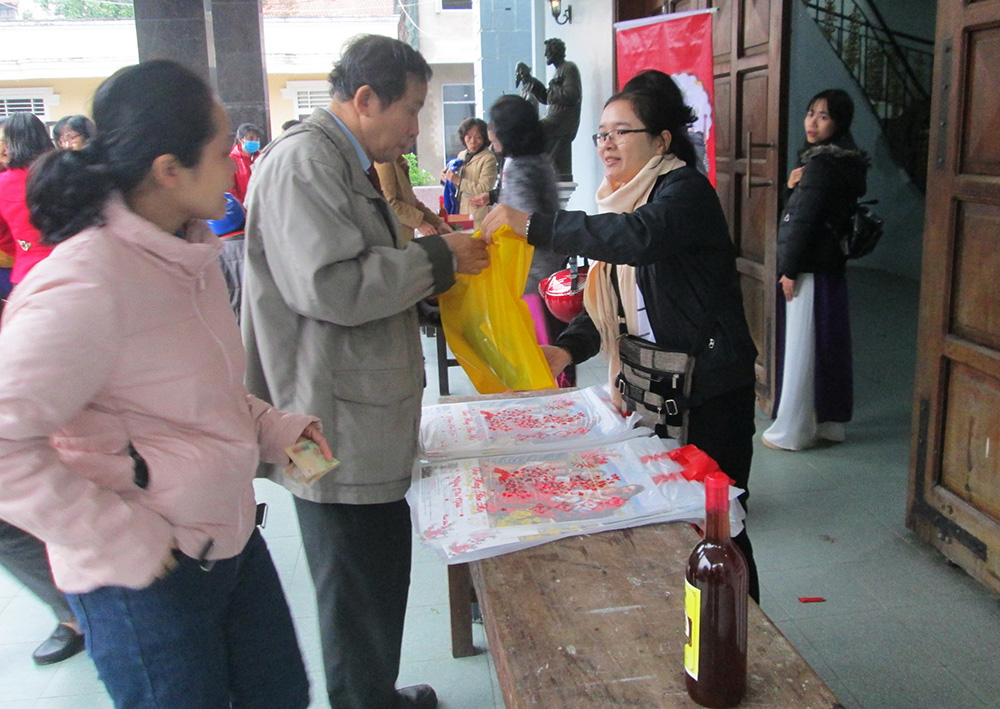
St. Paul de Chartres Sr. Nguyen Thi Huong sells 2021 calendars and wine at Gia Hoi Church on Dec. 6. (Joachim Pham)
"We sell calendars and wine at churches in the city from Dec. 6-13," Ly said. "We plan to offer scholarships to 100 poor students from provinces of Quang Tri and Thua Thien Hue, 1 million dong ($43) each on Dec. 20," she said. She said the area has recorded no local transmission of the coronavirus for three months.
Ly, 79, said the beneficiaries of the sisters' efforts are children of Pako ethnic villagers and those who have cancers and lung problems and get medical treatment at the Hue Central Hospital. Their families lost houses and crops during the severe floods and storms in October and November.
"We try to bring Christmas joy to the needy because Jesus comes to save all people," Ly said.
Daughters of Our Lady of the Visitation Sr. Mary Le Thi Anh Phuong, who is in charge of the congregation's Ministry Committee for Children, said that, this Advent, sisters introduce hundreds of local children whose parents are used-item collectors, vendors, goods carriers at markets and boat people to benefactors in France. "The children will write and tell them about their family conditions and ask for help," Phuong, 45, said.
The sisters also gather children from poor families in Hue at their motherhouse on Saturdays and teach them English, values and games. The nuns traditionally act out a colorful Nativity pageant for the children.
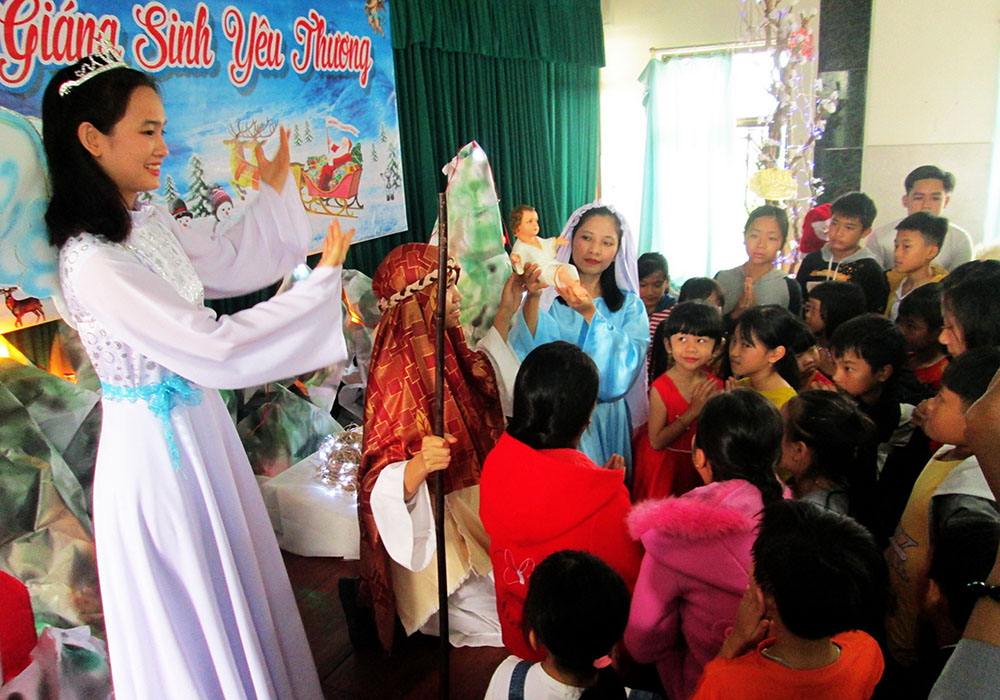
Children watch as Daughters of Our Lady of the Visitation sisters, acting as Joseph, Mary and angels, put on a Christmas pageant Dec. 5. The sisters gather children from poor families at their motherhouse in Hue on Saturdays and teach them English, human values and games, and traditionally do Nativity scenes and plays for them. (Joachim Pham)
She said her congregation does not hold Christmas parties for poor people as their tradition but spends the money in providing basic supplies for people in need.
Many people have no money to repair their houses and boats damaged by storms and floods, and lack blankets, mosquito nets and clothes in the winter. Children need books and other school supplies.
The Agriculture and Rural Development Ministry reported central provinces suffered severe floods caused by heavy rains and typhoons, killing 249 people, leaving 57 others missing, and damaging 241,500 houses for the past two months. The natural disasters wiped out 24,000 hectares of crops and fish farms and killed 3.2 million cattle and poultry. Economic damage is estimated at the cost of 30 trillion dong ($1.3 billion).
Sr. Mary Goretti Do Thi Lan, member of the Daughters of Mary of the Immaculate Conception, said this year her congregation decided not to organize parties on its patroness feast of the Immaculate Conception Dec. 8, and Christmas parties for hundreds of disabled people and daily earners, so as to save money for children and their families affected by the natural disasters. Last year, some 500 people were invited to such parties.
"This year, we plan to offer food, warm clothes and blankets to some 500 children in need," Lan said. The children are from families with HIV/AIDS and ethnic minority villagers in remote areas. Their crops were also damaged by the floods.
She said sisters made 1,000 face masks and gave warm clothes to students in this winter.
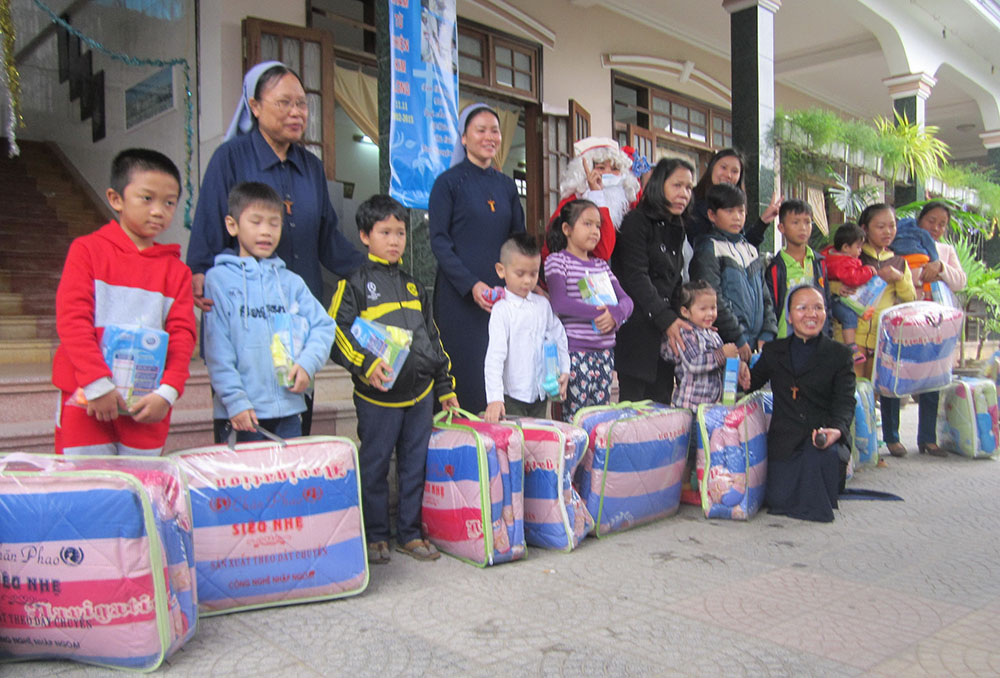
Daughters of Mary of the Immaculate Conception sisters in Hue on Dec. 3 offer blankets to children affected by COVID-19 and natural disasters. (Joachim Pham)
Lovers of the Holy Cross Sr. Teresa Truong Thi Dieu Hien said sisters in Quang Tri and Thua Thien Hue on Saturdays and Sundays in December held games and offered money, food and gifts to hundreds of disabled people and students whose families have lost their jobs due to the COVID-19 pandemic.
"Our brothers and sisters have suffered great losses due to the COVID-19 pandemic and natural disasters in this hard year, so we try to help as many people as possible to have something meaningful to celebrate the Christmas festival and look forward to a new year with prosperity and happiness," Hien said.
Zimbabwe: Prayers and gifts for those in need
Despite the challenges posed by the COVID-19 pandemic, the Carmelite Sisters in Zimbabwe are determined to make the best out of the season.
Sr. Anna Mandeya and the other sisters are planning to celebrate Christmas with the surrounding communities, pray with the needy and give out gifts as well.
"Christmas is a season of love and sharing, therefore we are going to make the best out of it," said Mandeya, noting that they will be sharing cooked food and offering gifts that might bring happiness to them. "Though the pandemic has brought in the new normal, this should not be a reason for us not to celebrate the birth of Jesus Christ."
The Southern African nation of 14 million people has reported the lowest cases of COVID-19 compared to other African countries. As of Dec. 19, a total of 12,047 cases had been confirmed, with 316 deaths, according to data compiled by the U.S.-based John Hopkins University.
Mandeya said that the Christmas spirit is alive and that they will be celebrating as a community while observing the COVID-19 safety measures.
The pandemic has changed one aspect of the sisters' Christmas outreach, Mandeya said. The sisters have always visited several orphanages and the sick, shared gifts and prayed with them.
"Before the pandemic, Christmas was always full of activities; we used to visit many orphan children and the sick to pray with them. But this year things are going to be a bit different," said Mandeya. "We are now going to visit a few orphanages and the sick to share meal, offer gifts and pray with them. We've limited our movement because we want to protect both our members and the outside community as well."
The sisters are hopeful that someday there will be an end to coronavirus and the people will be able to lead a normal life.
"I believe things are not going to stay the same forever and I'm hopeful that life will come back to normal someday," said Mandeya.
*An earlier version of this story gave an incorrect location.
[Doreen Ajiambo, Damian Avevor, Ceres Doyo, Patrick Egwu, Julie Ferraro, Joachim Pham, Soli Salgado, Dan Stockman and Saji Thomas contributed to this report.]
